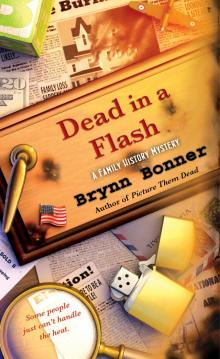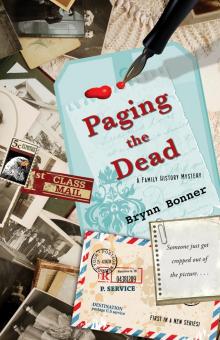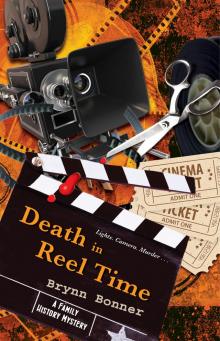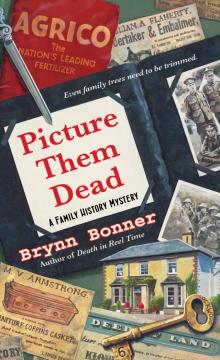- Home
- Brynn Bonner
Death in Reel Time
Death in Reel Time Read online
Thank you for downloading this Gallery Books eBook.
* * *
Join our mailing list and get updates on new releases, deals, bonus content and other great books from Gallery Books and Simon & Schuster.
CLICK HERE TO SIGN UP
or visit us online to sign up at
eBookNews.SimonandSchuster.com
To Eleanor Harris Bonner, beloved and missed
acknowledgments
To my cohorts of the Weymouth 7: Margaret Maron, Sarah Shaber, Diane Chamberlain, Kathy Trocheck (aka Mary Kay Andrews), Katy Munger, and Alex Sokoloff, who provide brainstorming, camaraderie, encouragement, and some of the most ridiculous Balderdash definitions ever put forth.
To members of the Cary Writers’ Group, for their input, especially Jo Ann Hoffman, beta reader extraordinaire.
To my agent, Cynthia Manson, and to Gallery editor Micki Nuding.
To my family, for their unwavering support.
And to all the past amateur genealogists in our family lines, thanks for marking the trail.
one
I FELT RIDICULOUS.
This was no way for a full-grown professional woman to present herself. I moved the gift bow someone had stuck on my forehead over to my temple, where I hoped it might make me look like an exotic island woman wearing a flower behind one ear. I sighed as I caught sight of myself in the mirror. It was a wasted hope.
“My mother used to tell me I was the greatest gift she ever got,” I groused, “but even she didn’t expect me to come gift-wrapped.”
“Sophreena Angelica McClure, you need to get over yourself,” my business partner and second mama, Esme Sabatier, scolded, adjusting the ribbon that ran across her ample chest like a beauty contestant’s sash. “I am all about my dignity but you don’t hear me complaining, do you? Anyway, we’re not the gift; it’s our genealogical services these wonderful friends are giving Olivia. This is just the presentation. Get into the spirit of the thing, girly.”
Easy for Esme to say. She’s a statuesque woman-of-a-certain-age with exotic features and a warm latte complexion. I’m shorter than Esme—much shorter. And small. My narrow body doesn’t allow for frills. So while Esme looked festive, I looked like an exhausted child who’d confused her directions at the Maypole dance and gotten hopelessly entangled in the streamers.
“Esme’s right, Sophreena,” Marydale Thompson said, fluffing the multiple ribbons festooning my upper torso. “I know this is silly, but just go along with it, please? Olivia’s wanted to trace her family history for as long as I’ve known her, and do not ask me how many long years that’s been. She and your mother and me were friends since all you kids were little bitty things. Let’s make this a special surprise for her, okay?”
I made an attitude adjustment and stretched a smile across my face.
Marydale Thompson had promised my dying mother she’d look after me, a vow she took seriously. She continues to hover over me even now that I’m in my thirties. And I’m grateful, most of the time anyway. Marydale’s a person you want in your corner. When Olivia Clement had been diagnosed with breast cancer it was Marydale who organized a brigade to bring meals, drive her to treatments, and perform other acts of kindness. Now that the treatments were over and Olivia was on the road to recovery, her friends wanted to give her one more gift—me and Esme. Or our expertise, anyway.
Not to brag, but Esme and I run a primo genealogical service. We ferret out information other researchers could never unearth. Every once in a while we disinter long-buried family secrets in the process. Which can be a sticky wicket sometimes, especially since Esme and I have our own secret.
We’re successful, in part, because we sometimes get help from the great beyond. Esme has the gift, or maybe it’s the gift; maybe it’s just heightened intuition. Could simply be Esme’s own subconscious leaking through. Who knows? Even Esme isn’t sure. But whatever you call it, it is maddeningly sporadic and the signs and messages she gets are often incomprehensible. Still, there are those stunning occasions when something spot-on comes through and we reveal a story no hours of poring over records in a dusty archive could ever have uncovered.
We guard this secret closely. In the genealogy world, where documentation and hard evidence are highly valued, this kind of folderol—getting information straight from the dead horse’s mouth—is heresy. We’d be drummed out of the corps. Only our four closest friends—the four others in our genealogy club—know about Esme’s special faculty. Marydale is one of those chosen few.
And so is Colette “Coco” Newsome, who at that moment opened the door from Olivia’s living room a crack and stage-whispered, “Are y’all about ready? What’s taking so long?”
Coco was dressed in her signature style: a long, gauzy skirt, a riotously colored tunic, and lots of jangling jewelry. Suddenly my ribbons and bows seemed positively staid.
“We’re all set,” Marydale said. “Are Beth and Daniel in there with Olivia?”
Coco snaked her hand through the doorway and beckoned impatiently. “Yes, yes, we’re all here—waiting and waiting. Come on!”
Olivia was on the sofa with her two adult children. She looked expectant and more than a little perplexed at the sight of Esme and me in our strange accoutrement. Marydale made the presentation speech, then Esme and I were on.
I curtsied and Esme rolled her hand and bowed like a magician about to perform a trick.
“On behalf of all your friends,” Marydale said, handing Olivia a card, “we give you the services of the best genealogists in the state—or perhaps the whole country—Ms. Sophreena McClure and her able assistant, Ms. Esme Sabatier. They’re going to help you trace your family history and all of us in the club will pitch in, too.”
Olivia’s face lit up. Even her hair, which post-chemo had come back curly and white as lamb’s wool, seemed to be illuminated.
“Isn’t this great, Mom?” Beth asked. “You’ve wanted to do this for years.”
“And it gets me off the hook,” Daniel said. “I’ve done some fumbling around on the Internet but I had no idea what I was doing and figuring out who’s who and how they’re all kin makes my eyeballs do that cartoon thing where they circle in opposite directions.”
“Not so fast, Daniel,” Olivia said, patting him on the leg. “This will be a family project. I’ll use it as a handy excuse to spend more time with you and Beth.”
Anyone acquainted with this family would know that was no hardship. Beth and Daniel adored their mother and had been devoted to her throughout her health crisis. Beth had taken an extended leave of absence from her job as assistant principal at Morningside High School to be with her mother throughout her treatments. And Daniel, who was an attorney in nearby Chapel Hill, popped over daily to help out.
I’d known Beth and Daniel most of my life. They were older than I and we weren’t close, but were friends the way the children of parents’ friends often are. Like cousins, I’m told, though I have little personal experience with that relationship since my parents were both only children.
I’d idolized Beth when we were growing up. She was a class act. Beautiful in a refined way and, on top of that, super-smart and good at everything she tried. In high school she’d been that rare breed, a popular girl who was well regarded across the spectrum, not just with the in-crowd. The jocks, outsiders, Goths, and nerds all had liked her, too.
And Daniel? Be still my heart. The boy every girl had a crush on but didn’t dare bring home to meet the parents. He had an edge, though he hadn’t earned one. Not that I knew of anyway, but he had an air of imminent danger about him, veneered over, just barely, with an easygoing charm.
Olivia scooted to the edge of the sofa. “I’m going to get all blubbery. Tell me what I need to do
to get started before I disgrace myself.”
“First thing is to find out what you know,” I said. “So that’s what we’ll do today. And Esme and I will want to go through all your family memorabilia to see what information we can glean.”
“Oh dear,” Olivia said. “I don’t have much here. There are boxes of stuff in my uncle and aunt’s old house out in Crawford. They were the last of the generation. They left everything to me. But Aunt Celestine passed on just before I was diagnosed and I haven’t had a chance to go out there and sort through everything.”
“Surprise again,” Daniel said, walking over to pull away the bedsheet that had concealed boxes stacked behind the sofa. “Beth and I drove out to Aunt Celestine’s house last week and gathered up everything we thought might be useful.” He tapped the top of a disintegrating cardboard box, which was so the opposite of archival it made me cringe. “Oh, and by the way, I brought back Uncle Riley’s gun collection, too. I figured they didn’t need to be out there in that empty house. But not to worry, I know how you feel about guns. They’re locked up out in your studio.”
“And you’ll never guess what else,” Beth said. “Daniel contacted the pastor at the church that sponsored your missionary grandparents and asked if they had any information about them and . . .” She gestured toward Daniel to pick up the story.
“And the pastor’s wife was pretty psyched to hear from me. Seems the old reverend’s wife had been saving some boxes of your grandparents’ things for years and she’d made the new wife promise not to throw them out in case someone came looking for them someday.” He swept a hand to encompass more boxes in equally alarming condition. “And we did! And here they are!”
Marydale rose and said, “Good, then. I’ll leave y’all to it. I need to get back to the shop.” She snapped her fingers and her two Westies, Sprocket and Gadget, scampered over to get their leashes clipped on.
“I gotta go, too,” Coco said. “Pottery’s not gonna fire itself. Call us, Sophreena, and give us our assignments. You know the ancient-history club is on standby.”
I smiled and nodded. Winston’s shrew of an ex-wife, Patsy, had given us that sobriquet when Winston had gone digging into an area of his family history that she’d just as soon he’d kept hidden. Contrarians that we all are, we adopted it as a badge of honor. I’d already worked up a plan, dividing the family lines so we could get Olivia a good start on the project, and after I talked with Olivia I’d tweak the lists and drop by Marydale’s shop to deliver hers and Coco’s.
Marydale’s papercraft shop, Keepsake Corner, is located right in the heart of downtown Morningside, about a mile from Olivia’s house. It’s my happy place. I go there often to get my fix of artisan papers and heritage scrapbooking supplies. It’s right next door to the Morningside Craft Co-op, where Coco sells her pottery wares. Marydale and Coco had opted to walk over on this glorious North Carolina fall day. I was envious.
Esme and I shed our gift-wrapping and pulled up chairs to begin our initial interview. Normally at this point in the process Esme would have begged off, claiming pressing business elsewhere. She doesn’t much care for the one-on-one with clients, but Olivia was an exception. She and Esme belonged to the same church and Olivia had been among the first to make Esme feel welcome when she’d moved here six years ago to join me in my genealogy services business.
Not that I’d been looking to take on a partner. I was just starting out and didn’t have enough clients to support my own self. I met Esme down in Louisiana on my first big job, and though I found her a little scary in the beginning, I came to like her. A few months after the job was over she contacted me and told me we were to be partners in the business. She announced it as a fait accompli, and though I’m normally a cautious and analytical person, I agreed immediately. I still haven’t figured out why I did that, but I’ve learned over the years that getting messages from the great beyond isn’t Esme’s only gift. She can also hoodoo people into agreeing to things before they even know what’s happening. Especially me.
* * *
After Marydale and Coco were gone we talked logistics for a bit and decided that for the next session we’d set up shop in Olivia’s dining room, since working at home was easier for her. Her recovery was going well and she was getting her strength back, but her stamina was lagging.
“We’ll get you started on your heritage scrapbooks,” I said, “but to streamline the process Esme and I will take a few of the boxes of artifacts home with us each day. We’ll organize the material and put it into proper containers. Our task for today is a preliminary interview, and the first question we always ask is if there’s any particular thing you want to know about your family history.”
“Absolutely,” Olivia replied immediately. “I want to know about my father. He ran off before I was born and I know very little about him. He was a forbidden subject in my family. What I eventually pieced together was that he ran off to avoid being drafted into World War Two. It brought terrible shame on the family. I’d like to know what became of him.”
“Okay, tell me everything you know about your family,” I said, grabbing a yellow legal pad and pen from my bag.
“Starting with what?” Olivia asked. “I don’t know where to jump in.”
“Just tell it however it comes to you,” I said. “We’ll help you sort it all out and make sense of it later.”
I had my pen at the ready, but just then a loud crack split the air. I lost my grip on my pen, my legal pad, and my wits. Esme and I both startled and ducked down, clutching the arms of our chairs.
“Tony’s home,” Olivia announced breezily, craning to look out the front window.
“Sorry,” Beth said, bending down to look at us, her face at a tilt. “His motorcycle needs some engine work. It backfires at the most inopportune times. That’s Tony Barrett. He’s one of my former students from Morningside High.”
Esme and I both sucked in a breath as we sat up straight. I pushed my glasses up on my nose and adjusted my jacket, freeing the button from where it had caught on the chair cushion. This had not been my day for decorum.
“Tony’s become a filmmaker,” Beth went on, “and he’s come back to make a documentary about Morningside. He’s been staying in Mom’s basement.”
A moment later a young man I gauged to be in his early twenties stood framed in the living room doorway, his motorcycle helmet cradled under one arm. He had the brooding good looks of a brat-pack movie actor. His dark hair fell casually over one eye and he scooped it back and gave us all a white-toothed grin.
“Were you surprised?” he asked Olivia.
“You knew about this, too?” she asked.
“Yeah, it’s cool.” He walked over to Esme and me and put out his hand. “I’m Tony, and I know who you two are.”
“Are we famous or infamous?” Esme asked dryly, shaking the proffered hand.
“Fame and glory all the way,” Tony said, reaching across to give my hand its turn. “Listen, I know we just met and you don’t know me,” he said, “but I wanted to ask if I could elbow in on this project. A buddy of mine is doing these family history scrapbook videos and it’s been a great gig for him to support his other work. I’d love to have one for my portfolio and I was thinking maybe I could do one for Olivia. It could be my gift to thank her for letting me roost here for a while.”
I considered. “I suppose,” I said, looking over at Esme, who stuck out her lower lip and wiggled her head to and fro before nodding her assent.
“Great,” he said. “When are you gonna start?”
“We were just about to begin the initial interview,” I said, retrieving my pen and pad from the floor.
“Can I grab my camera?” he asked, jerking a thumb over his shoulder.
I turned to Olivia. “Are you okay with this?”
“Sure, why not?” she said. “Though if I’d known I was going to have all this excitement today I would have primped a little more this morning.” She smoothed the front of her red T-shirt
and patted at her hair.
After Tony left the room I worried that I’d agreed too soon to his involvement. Video scrapbooking was a new trend, one I’d wanted to explore, but I wondered how the presence of the camera might affect the interviews and how much it might slow down the process. Esme must have been having the same second thoughts as she whispered out of the side of her mouth, “Just so he knows, he works on our schedule, not the other way round.”
I was pleasantly surprised when Tony came back a moment later with only a small camera mounted on a slim tripod. I’d been anticipating an intrusive shoulder-mounted camera and an array of hot lights. He set up quickly in an out-of-the-way spot by the window and asked us to pretend he wasn’t there.
Though I suspected that might be easier said than done, after a few minutes I forgot about the camera and it seemed Olivia did, too, though she was still struggling to find a way into her story.
“Let’s try this,” I said. “Start off with ‘I was born in . . .’ ”
She nodded. “I was born in Crawford, North Carolina—that’s about seventy miles from here—in January 1944. My mother’s name was Irene Damaris Lockwood Hargett. People called her Renny. She was born August 17, 1924, and she died in 1981. I never knew her parents, my grandparents. Their names were Thomas Lockwood and Victoria Lockwood. I don’t know middle names and I don’t know my grandmother’s birth name, nor any dates for them. They were foreign missionaries and they died in a ferry accident somewhere overseas just after I was born. They never set eyes on me.
“My father, the black sheep of his family, was named John Lamont Hargett. I think most people called him Johnny. He ran off before I was born, so he never saw me, either. His parents died young, too, so I didn’t have any actual grandparents in my life. But my father’s older brother, Riley Hargett, was like a grandfather to me. He and his wife, Celestine, lived right next door to Mama and me. They never had children of their own and they doted on me. I loved them dearly. Riley died in 1985 and Celestine passed a little over a year ago, at the golden age of ninety-seven. She lived alone in her own house until her dying day. That’s about all I know.”

 Dead in a Flash
Dead in a Flash Paging the Dead
Paging the Dead Death in Reel Time
Death in Reel Time Picture Them Dead
Picture Them Dead